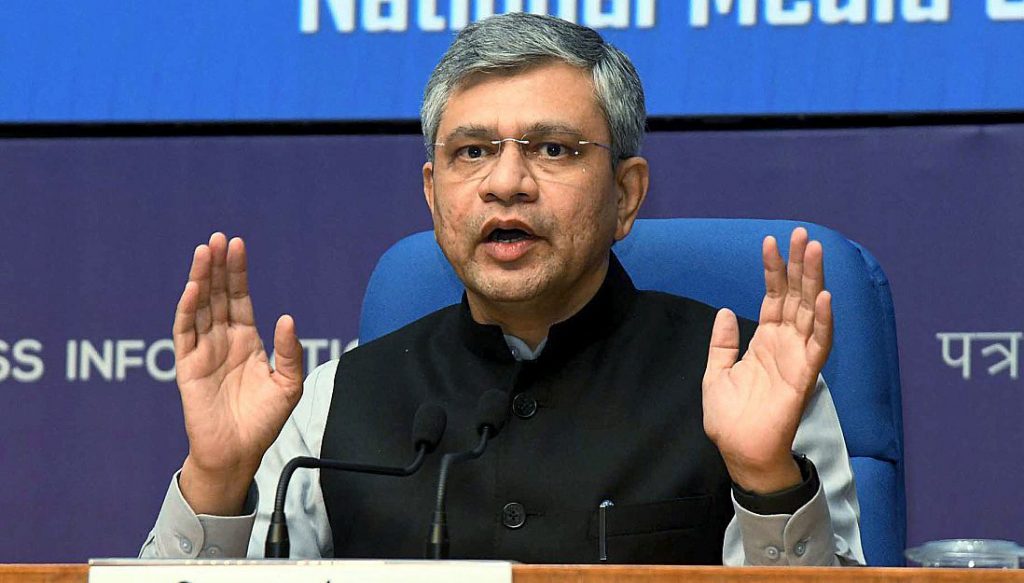New Delhi: Union Minister Ashwini Vaishnaw Tuesday said the government will push ahead with its tech-driven agenda of cementing India’s global lead in semiconductor and electronics manufacturing, and as a technology and digital hub.
Taking charge of Ministry of Electronics and IT (MeitY) — a nodal ministry tasked with crafting crucial policies and regulations for fast-evolving digital and tech landscape — Vaishnaw vowed that the government would build on the past momentum and leverage the power of technology and digital solutions to improve lives of people.
He highlighted that the Modi government’s Digital India initiative has empowered the common man, bringing transformative changes through Jan Dhan, Aadhaar, and other programmes over the last 10 years.
Vaishnaw, who retained his electronics and IT portfolio in Modi 3.0 government, took charge of MeitY Tuesday morning, after assuming office in Railways as well as Information and Broadcasting — the two other ministries allocated to him.
Vaishnaw said his efforts will be to ensure that technology continues to bring positive changes in the lives of people in the country, and that it empowers youth with a promising future driven by new-age tech.
“Modi government will continue its work of bringing transformative change in people’s lives, through use of digital technologies…India will keep its lead in every segment, be it semiconductor, telecom tech, manufacturing tech….,” Vaishnaw told reporters.
Over the past years and months, Vaishnaw has scripted success stories around electronics and semiconductor manufacturing and also spearheaded the enactment of crucial pieces of legislation like Digital Personal Data Protection Act.
Mobile phone manufacturing during Vaishnaw’s tenure crossed Rs 4.1 lakh crore worth of production, marking a 21-fold jump compared to 2014-15, when 98 per cent of local demand was met through imports. The country now meets 97 per cent of its total mobile phone demand, locally.
So far as regulations go, the DPDP Act approved by Parliament in August last year seeks to crackdown on misuse of individuals’ data by online platforms. It mandates several compliance requirements for the collection, processing, and protection of personal data, and entails up to Rs 250 crore penalty for any data breach.
The DPDP moots creation of Data Protection Board of India to handle grievances of individuals around personal data privacy if data fiduciaries or firms using personal data fail to address individuals’ complaints.
Vaishnaw’s return to the ministry also sets the stage for taking forward the work on proposed Digital India legislation, which would replace the 24-year-old IT Act.
As it is, MeitY has been doing the groundwork on draft Digital India legislation that would provide guardrails and prescribe regulatory approach to new-age technologies like artificial intelligence (AI). It would also offer stringent safeguards against newer forms of online offences such as deepfakes, catphishing, doxxing, cyber stalking among others.
India has been pulling out all the stops to bolster its semiconductor and electronics manufacturing capabilities, and Vaishnaw, during his tenure in Modi 2.0 was instrumental in getting global storage semiconductor firm Micron to set up a chip assembly plant followed by investments from indigenous conglomerate Tata to set up a chip manufacturing plant in Gujarat and an assembly unit in Assam.
A fourth unit has been set up by CG Power in partnership with Renesas Electronics Corp and Stars Microelectronics in Gujarat.
India’s AI agenda too is action-packed.
Before heading for 2024 general elections, the Modi government had approved an allocation of over Rs 10,300 crore for the IndiaAI Mission to bolster India’s AI ecosystem.
The financial infusion, slated over the next five years, is poised to catalyse various components of IndiaAI Mission, including pivotal initiatives like the IndiaAI Compute Capacity, IndiaAI Innovation Centre (IAIC), IndiaAI Datasets Platform, IndiaAI Application Development Initiative, IndiaAI FutureSkills, IndiaAI Startup Financing, and Safe and Trusted AI.
Nittin Arora, Partner, Grant Thornton Bharat noted that several policy measures have been announced over the years, to promote indigenisation, job creation and entrepreneurship. He mentioned the thrust on PLI schemes for sectors including telecom and electronics hardware, significant spends on digital infrastructure, and incentives for deep-tech/ 5G.
“The government is likely to continue on its glide path with similar budgetary measures to foster a robust ecosystem for research and development, innovation and manufacturing in the country,” Arora said.
PTI
